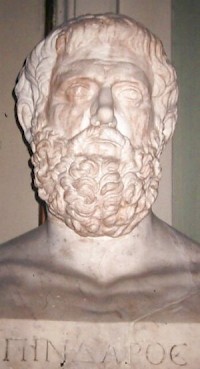Pindar - Livius (original) (raw)
This page is a stub. It will be expanded to a full-fledged article.
Pindar (518-438): famous Greek poet, well known for his odes.
Pindar
The name of the Boeotian poet Pindar will forever be connected with the Isthmian, Pythian, Nemean, and Olympic games. Any victorious aristocratic athlete could rent the services of Pindar, who would write an ode to his patron, whose victory was always presented as a manifestation of the power of the eternal gods. These "epinician odes" are extremely formal poems, which make great demands on the poet's ability to employ identical metres.
Pindar's world was that of the old aristocratic families, but in the second half of his life, this world was rapidly disappearing when democratic Athens became the leading power in Greece, and for some time forced Boeotia to be part of the Delian League. Nevertheless, the poet praised the city that had twice warded off a Persian invasion (in 490 at Marathon and in 480 at Salamis) with the famous words that it was the
violet-crowned bulwark of Greece
And although he was conservative in his opinions, Pindar was responsible for the introduction of a new god in Greece: Zeus-Ammon.
Pindar has received one of the most remarkable tributes that was ever given to a poet. When Alexander the Great sacked Thebes in 336, he ordered that the house of Pindar should remain intact.
